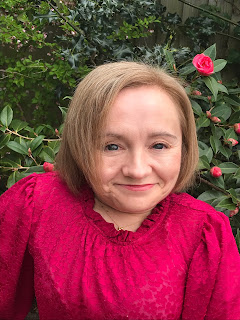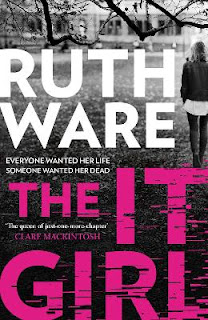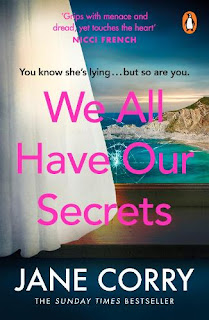TW's Penny Batchelor's Second Novel Her New Best Friend
August is special for Thriller Women because it's the month in which both co-founders, EC Scullion and Penny Batchelor, publish their second books with RedDoor Press. Join them on 19th August at 8pm for a joint online launch. It's free to register and you will receive a 10% discount code off both books: https://www.eventbrite.co.uk/e/a-thriller-women-celebration-tickets-164627801185
First up on the blog is Penny Batchelor's Her New Best Friend, a novel about motherhood, secrets and how much can you really trust your friends. Dubbed 'mum noir' it was described by reviewer Paul Blezard on LoveReading UK as 'a white-knuckle tense thriller that has more twists than a Simone Biles gymnastics routine'.
EC Scullion took the opportunity to grill Penny including her author goals, the TV she watched and books she read during lockdown, and her top writing tip.
Download the ebook of Her New Best Friend from Amazon or buy the paperback from Thriller Women's list at Bookshop.org. NB: if you buy books through this link we may earn a commission from bookshop.org, whose fees support independent bookshops.EC: As an author, what have you been up to in the year since the publication of My Perfect Sister?
PB: I've been very busy writing Her New Best Friend and networking with the writing community - authors really are a great, supportive bunch of people. Self-marketing has taken quite a lot of my time too, building my social media profile, appearing at online festivals and talking to book groups who did me the honour of reading My Perfect Sister. Then I had my freelance journalism jobs too, which now includes a monthly column for The Bookseller on disability and publishing issues.EC: Congratualtions on the release of your latest book. Can you tell us a little about Her New Best Friend (no spoilers!) and how you came up with the idea for the story?
PB: Certainly. I'm calling it 'mum noir'!
Mother-of-two Audrey is horrified when during a moment of distraction in the park her pram with baby Wilfred in it rolls down the hill and into a pond. Fortunately for her Claire, a stranger, is nearby and saves the day. The two quickly become firm friends but how much does Audrey really know about Claire?
Her New Best Friend is a twisting tale of intrigue and deception, the lengths a mother will go to in order to protect her children and of what happens when your worst nightmare as a parent comes true…
EC: Psychological thrillers remain hugely popular in the UK fiction market - what do you think is their enduring appeal?
PB: I think because people like reading about precarious situations when they themselves are in a safe environment. With thrillers usually something happens, known as the 'inciting incident', that sets off chain of events leading to peril. In Her New Best Friend the inciting incident is Audrey's pram, containing her son Wilfred, rolling into the pond. We may fear such situations or wonder how we would act if they were thrust upon us. As a writer I have great fun exploring my darker side with the more nefarious characters! Also, certainly with domestic thrillers, we can all relate to issues surrounding family relationships, friends, work and the like.
EC: You've welcomed the surge in literary festivals switching to online rather than in-person as a result of the pandemic. How important is it that the industry doesn't revert to its old ways when the pandemic is over?
PB: Very, very important and I've written about this in my monthly column with The Bookseller. Online festivals have democratised literature, enabling people who previously couldn't afford the ticket and travel, or perhaps weren't physically able to travel, to attend. Literary festivals also have the reputation, rightly or wrongly, of being a bit elitist and white middle class, which can be off-putting if you don't fit the bill. Now anyone can see their favourite author and meet new ones for from the comfort of their own home, wherever they live.
EC: You've been a champion for other disabled authors over the last year. Following the pandemic, has there been a change in attitude in the publishing industry towards disabled writers, or is there still much work to be done. Are we seeing more disabled characters represented in fiction?
EC: For you, what's the best thing about being a writer, and on the flip side, what's the worst?
EC: What are your author goals over the next year?
PB: I've got a week's holiday coming up, which I'm really looking forward to. I'll be away from home and plan on not taking my laptop or looking at social media! That'll renew my creative batteries to continue writing book 3. I hope to keep promoting Her New Best Friend and build on my readership. I'm also involved in a very exciting literary project, which very annoyingly I can't tell you about, but, fingers crossed, should launch in 2022.
EC: What's the most useful piece of advice you've ever been given about writing fiction?
EC: It's been reported recently in the media that men are still more reluctant to pick up a book that's been written by a female author. Why do you think that is, and what can authors and the publishing industry, or others do, to change this?
Quick fire questions:
EC: Favourite book you read during lockdown?
EC: Favourite TV series/film you watched during lockdown?
EC: The thing you missed most during lockdown?
EC: The things you didn't miss during lockdown?
EC: The first country you would like to visit when it's safe/easier to do so?
Thanks Penny!
It'll be Penny's turn to ask the questions in a fortnight when Emma's second novel Evaders is published.




Comments
Post a Comment